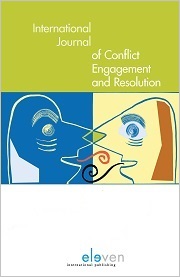|
Recent decades have witnessed the appearance of multiple grounds for vaccine hesitancy. One of the options to deal with this phenomenon is legislative. Given that vaccination enforcement through law raises allegations of infringement of constitutional rights, interventions seeking to promote vaccination compliance should rather address the factors that influence vaccine hesitancy, which are – by and large – related to trust in health authorities. Trust in health authorities may be promoted by a procedure for compensating the comparatively few vaccination victims reflecting a willingness to acknowledge liability and commitment to social justice. |


International Journal of Conflict Engagement and Resolution
About this journalSubscribe to the email alerts for this journal here to receive notifications when a new issue is at your disposal.
| Editorial |
|
| Authors | Michal Alberstein, Nadav Davidovitch PHD and Shelly Kamin-Friedman |
| Author's information |
| Article |
|
| Keywords | public health, trust, vaccination, health law, health policy |
| Authors | Shelly Kamin-Friedman |
| AbstractAuthor's information |
| Article |
|
| Keywords | public health, apology, disclosure of medical errors, collective healing process, ringworm case |
| Authors | Dr. Nili Karako Eyal |
| AbstractAuthor's information |
|
The issue of apology and disclosure of medical errors in the context of the physician- patient relationship has attracted increasing attention in recent years. On the other hand, it has received little attention in the context of public health activities, thus missing the collective healing potential of apologizing and providing information to the public. |
| Article |
|
| Keywords | labor disputes, health policy, public health, conflict resolution |
| Authors | Adi Niv-Yagoda |
| AbstractAuthor's information |
|
The Israeli health system consists of approximately 200,000 employees in a variety of positions, such as: doctors, nurses, pharmacists, psychologies, physical therapists, lab workers, speech therapists, occupational therapists, dieticians, orderlies, administrators and housekeeping workers and many more. (Ministry of Health, 2016). The system has gone through long-lasting struggles, conflicts and crises initiated by power groups and various functional representations and unions. This article will focus on conflicts occurring between doctors, in their professional occupation, and the governmental ministries (Health and Treasury). In addition, it will examine the processes that encourage the occurrence of conflicts in the health system. Even though doctors do not represent the entire health system, it is important to emphasize that they are its beating heart. Their weight in the general health system is extremely high, much higher than their relative part therein. |
| Article |
|
| Keywords | negotiation, ethics, academia, mentorship, authorship |
| Authors | Andrea Schneider and Rachel Gur-Arie PhD |
| AbstractAuthor's information |
|
Authorship is a feature of career success and is relevant for practically all health science fields. Yet negotiating co-authorship is one of the most difficult processes academics encounter. The stakes are high, issues can be complex, and negotiators’ motivations are often multifaceted. The tools presented in this article – preparation, relationship development, and communication – can be used to increase the likelihood of a successful negotiation. Through the use of a case study, this article illustrates how a typical junior colleague can negotiate with their mentor. Additionally, this article outlines various standards of co-authorship to ensure that published authorship reflects appropriate standards of the field. The goal is for academics to be able to negotiate not only effectively, but also ethically. |
| Article |
|
| Keywords | public health, Alternative Dispute Resolution, public law, health promotion |
| Authors | Michal Alberstein and Nadav Davidovitch PhD |
| AbstractAuthor's information |
|
This paper examines the intersection between the two professions – law and medicine – with reference to systematic transformations that have characterized their development in the past century. In particular, the paper examines the co-emergence of the new public health and health promotion scholarship along with the development of the Alternative Dispute Resolution (ADR) movement in the second half of the 20th century. The two movements, with their later developments, have aspired to change the focus of professionals in the field, and both have been tremendously successful on the one hand, and on the other have remained marginal to mainstream training and identity building of contemporary lawyers and doctors. |

 Issue 1
Issue 1